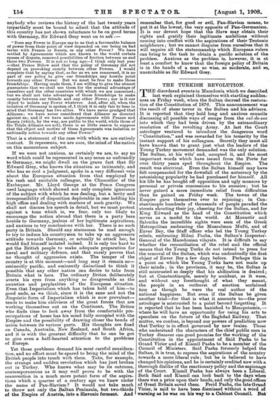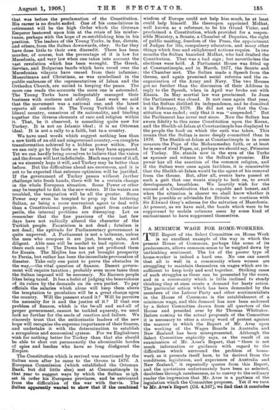THE TURKISH REVOLUTION. T HE disordered events in Macedonia which we
described last week explained themselves with startling sudden- ness on Friday week, when the Sultan decreed the restora- tion of the Constitution of 1876. This announcement was the result of sheer terror in the Sultan and his advisers. It is reported that they held long and anxious councils discussing all possible ways of escape from the cul-de-sac into which they had been driven by the extraordinary resolution of the revolting Army. At last the Court astrologer ventured to introduce the dangerous word " Constitution," and was rewarded for his temerity by the instant support of his colleagues. Secretly they must all have known that to grant just what the leaders of the Young Turkey movement demanded was the only solution. The Sultan, at his wits' end, accepted it, and the most important words which have issued from the Porte for over thirty years sped throughout the Empire. The result was electrical. Even the Sultan himself may have felt compensated for the downfall of the autocracy by the astonishing popularity he had purchased for himself. All his life he has bought off opposition and ugly menaces by personal or private concessions to his enemies ; but he never gained a more immediate relief from difficulties than he gained on Friday week. The towns of the Empire gave themselves over to rejoicing; in Con- stantinople hundreds of thousands of people paraded the streets shouting their joy, cheering for the Sultan, and for King Edward as the head of the Constitution which serves as a model to the world. At Monastir and Salonika the incredible sights were seen of the Greek Metropolitan embracing the Mussulman Mufti, and of Enver Bey, the Staff officer who led the Young Turkey rebels, embracing Hilmi Pasha, the Sultan's Inspector- General of the Macedonian vilayets. It is difficult to say whether the reconciliation of the rebel and the official means that the Young Turks do not intend to press for the removal of the Sultan, which was undoubtedly the first object of Enver Bey a few days before. Perhaps this is a point on which the Young Turks have not made up their minds ; in the provinces, it may be, the Sultan is still mistrusted so deeply that his abdication is desired ; but at Constantinople, merely by accident, as it were, and without any forethought of what they meant, the people in an outburst of emotion acclaimed him as though he were the real author of the national happiness. But even if the Sultan be given another trial—for that is what it amounts to—the poor astrologer is mistrusted to a point beyond forgetting. It is reported that he has been banished to Mesopotamia,— where he will have an opportunity for using his arts to speculate on the future of the Baghdad Railway. That matter, we confess, is beyond our powers of prediction now that Turkey is in effect governed by new brains. Those who understand the characters of the chief public men in Turkey discover one good promise for the Working of the Constitution in the appointment of Said Pasha to be Grand Vizier and of Kiainil Pasha to be a member of the Council of Ministers. Said Pasha fetinerly helped the Sultan, it is true, to repress the aspiration's of the country towards a more liberal rule ; but he is believed to have changed his opinions, and he is certainly credited now with a thorough dislike of the reactionary policy and the espionage of the Court. Iliamil Pasha has always been a Liberal. Both Said and Hiamil can look back to the days when there waft a pride upon their heads, and only the good offices of Great Britain saved them. Ferid Pasha, the late Grand Vizier, is said to have been dismissed without a Word of warning as he was on his'way to a Cabinet Council. But that was before the proclamation of the Constitution. His career is no doubt ended. One of hie consolations in retirement will be the high Order which the German Emperor bestowed upon him at the crisis of his misfor- tunes, perhaps with the hope of re-establishing him in his position. The leaders of the Young Turks, in fine, dictate, and others, from the Sultan downwards, obey. So far they have done little to their own discredit. There has been murder, of course, but the percentage of it is low for Macedonia, and very low when one takes into account the vast revolution which has been wrought. The Greek, Serviani and Bulgarian bands which have roved over the Macedonian vilayets have ceased from their infamies ; Mussulmans and Christians, as was symbolised in the public embraces of the representatives of Islam and the Orthodox Church, are united in keeping the peace. The more one reads the accounts the more one is astounded. The Young Turks have indisputably managed their business with coolness and ability. Last week we said that the movement was a national one, and the latest reports all confirm it. The Young Turkish ideal is a liberal country, conscious of its nationality, and binding together the diverse elements of race and religion within it. That, be it observed, is something quite new for Turkey. It is not an Islamic ideal ; it is an Ottoman ideal. It is not a rally to a faith, but to. a country.
We have used words which suggest nothing less than a new birth of an old and misgoverned country,—a complete transformation achieved by a hidden power within. For we can only go by the facts so far as they have appeared. Yet we can hardly bring ourselves to believe that the vision and the dream will last indefinitely. Much may come of it all, as we sincerely hope it will, and Turkey may be better than before. But the difficulties ahead are enormous, and it is not to be expected that extreme optimism will be justified. If the government of Turkey passes without further challenge into fresh hands, there will be a certain change in the whole European situation. Some Power or other may be tempted to fish in the new waters. If the waters are troubled, the temptation will be all the greater. Some Power may even be tempted to prop up the tottering Sultan, as being a more convenient agent to deal with than a Constitutional people. But apart from exterior perils, the internal problems are dismaying. Let us remember that the fine passions of the last few days have not radically altered the character of the Turkish people. Fanaticism is not dead ; fatalism is not dead ; the aptitude for Parliamentary government is quite unproved. A Parliament is not a talisman, unless the men who compose it are just, honest, calm, and diligent. Able men will be needed to lead opinion. Are there such men ? The Duma has not yet produced them for Russia. The Mejliss has not yet brought prosperity to Persia, but rather has been the immediate provocation of disaster. Take only one point to prove the obstacles in the way,—the vital question of finance. Decent govern- ment will require taxation ; probably even more taxes than the Sultan imposed will be necessary. No Eastern people likes being taxed. It has a habit of judging the benevolence of its rulers by the demands on its own pocket. To pay officials the salaries which alone will keep them above the temptation to peculation will be a great charge upon the country. Will the peasant stand it ? Will he perceive the necessity for it and the justice of it ? If that one problem of finance, whioh is the be-all and end-all of proper government, cannot be tackled squarely, we need. look no further for the seeds of reaction and failure. We sincerely trust that the enthusiastic leaders of the new hope will recognise the supreme importance of their finance, and undertake it with the determination to establish a scrupulous and economical system. For we Englishmen wish for nothing better for Turkey than that she should be able to shut out permanently the abominable hordes of spies and leeches who have so long disfigured the Empire.
The Constitution which is revived was sanctioned by the Sultan soon after he came to the throne in 1876. A European Commission (which established the Ottoman Banks but did little else) met at Constantinople in that year to suggest ways by which the Sultan m igh set in order his European provinces, and be extricated from the difficulties of the war with Servia. The Sultan apparently wanted to show that if the combined wisdom of Europe could not help him much, he at least could help himself. He thereupon appointed Midhat, well known as a reformer, to be his Grand Vizier, and proclaimed a. Constitution, which provided for a respon- sible Ministry, a Senate, a Chamber of Deputies, the right of public meeting, freedom of the Press, the appointment of Judges for life, compulsory education, and many other things which free and enlightened nations require. In two months the Sultan banished Midhat, who had drafted the Constitution. That was a bad sign ; but nevertheless the electiotts were held. A Parliament House was fitted up at Constantinople, and in March, 1877, the Senate and the Chamber met. The Sultan made a Speech from the throne, and again promised social reforms and the re- organisation of the Army and Navy. The two Houses got no further than the discussion of their Address in reply to the Speech, when in April war broke out with Russia. In May martial law was proclaimed. In June the Parliament was closed. It met once again that year, but the Sultan disliked its independence, and he dissolved it in February, 1878. He did not say that the Con- stitution was ended ; only that it was " suspended." But the Parliament has never met since. Now the Sultan has sworn fidelity to this same Constitution upon the Koran, and the Sheikh-ul-Islam at Constantinople has displayed to the people the book on which the oath was taken. This means that the Sultan is more deeply committed than in 1876. The Sheikh-ul-Islam at Constantinople is in some measure the Pope of the Mohammedan faith, or at least he is one of rival Popes, or, perhaps we should say, Primates of Turkey. He. stands now in the eyes of the Turks as sponsor and witness to the Sultan's promise. His power has all the sanction of the common religion, and if the Sultan were once again faithless, it is conceivable that the Sheikh-ul-Islam would be the agent of his removal from the throne. But, after all, events have passed at such a gait that one wants simply to look on, to await developments, breathless. We heartily wish for the success of a Constitution that is capable and honest, and when the situation is clearer we shall know whether it will be possible or advisable for Britain to continue with Sir Edward Grey's scheme for the salvation of Macedonia. At present, as we have said, the bands which were to be suppressed by mobile columns seem by some kind of enchantment to have suppressed themselves.



































 Previous page
Previous page